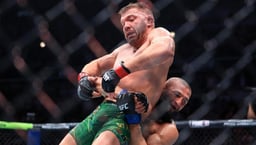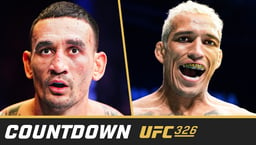
Issue 108
December 2013
As head of the Nevada State Athletic Commission, Keith Kizer is one of the most influential men in MMA. And when he speaks the combat sports world listens. He tells FO what it’s like to bear such responsibility.
Take a quick look at any comprehensive list of the most influential people in mixed martial arts and the name of Nevada State Athletic Commission (NSAC) executive director Keith Kizer will never be far from the top.
Kizer and his staff have the weighty responsibility of being the global leader in regulating, licensing and overseeing combat sports. So, in this case, what happens in Vegas doesn’t stay in Vegas, because where the NSAC leads, other states and territories follow.
But Kizer takes that responsibility in his stride, telling FO: “Nevada is a pretty small state, population wise. There isn’t a lot of diversity here with respect to businesses. You have the gaming as the main engine. Whenever anyone in the state – or even the world these days thanks to the proliferation of gambling – has a question regarding gaming they always ask themselves how the Nevada Gaming Control Board or the Nevada Gaming Commission would deal with it.
“Well, the same thing goes for the Nevada State Athletic Commission when people have a question about boxing or mixed martial arts.”
When asked what his average day entails the response quickly expands to cover the entire busy week as Kizer states: “Me, personally, I am the top person on a daily basis, although I do answer to the five commissioners who are appointed by the state governor.
“I execute, with the help of the staff here, what the commissioners want with respect to the fights that take place in Nevada. My average days really depends on what time of the week it is.
“Early in the week we might be waiting on medicals to come back. We are assigning the officiating, handling report times for the fights. A lot of it is scheduling and reports, things like that.
“Later in the week, come Friday, we are at the big weigh-in and fight night. My favorite time sometimes is leaving the arena after a fight, knowing everything went well, knowing no one got seriously injured, knowing the level of controversy is small. Then I can go relax on Sunday and get ready to do it all over again.”
He adds: “Most of the work we do here is office-based. We make sure the medicals are in and legit, and everyone gets assigned and knows where they are going. We also make sure the results are accurately reported on Monday morning, helping the public, helping the fighters.
“We also try to be as user-friendly as possible and deal with a wide range of questions, all of which we answer to the best of our ability.
“But whatever it is, it’s always exciting. Dealing with these sports anywhere would be great, but doing it in Nevada, in the fight capital of the world, is fantastic.”
Yet, with great power comes great responsibility (and criticism) and the NSAC is a lightning rod for controversy when it comes to refereeing and judging in MMA. But again it’s a responsibility Kizer is only too happy to take on, especially when you get him on to the area of fighters’ safety.
He says: ”Look at the record of the sports, boxing, kickboxing and MMA – especially over the last seven years. It has been very impressive, not just in Nevada but in other places as well.
“Outsiders to the sports could easily assume we have fatalities on every card. It’s inherently dangerous. It always will be. These are the sports where you win by hurting your opponent as best you can, hopefully to the point that he or she cannot continue.
“There are no other sports like that. You start from that reference point, and look at the actual results and you will see it is very impressive. Most of that credit goes to the referees and ringside doctors and the inspectors that work the show.
“Also, the matchmakers have been very good, especially in MMA. The contests are incredibly fair and there’s no such thing as a sacrificial lamb. Fighters just sometimes have a bad night.”
And as for the criticism many level at refereeing and judging decisions in combat sports, Kizer is somewhat stoical, stating: “It’s funny, I was just watching a video of someone who was saying that every sport, and every official in every sport is terrible.
“That’s the mind-set you have as a fan, whether it’s baseball, basketball, football or MMA. The nature of officiating is always going to call for some level of discretion and it’s always going to call for some level of judgment. Sometimes you are wrong and sometimes you are right. Overall, I think these officials are very highly trained, very experienced and do a very, very good job.
“I also like in other sports when people say, ‘Well, when you watch the instant replay in slow motion four or five times you can see clearly that the player was out of bounds.’ OK, that’s true. But when you get the instant replay and slow it down you can see the guy did beat the guy to first base. However, in real time it’s hard. That’s not saying that officials don’t make poor calls, because they do, and sometimes those mistakes are mind-boggling. That is so rare but it does happen.”
And as Kizer is keen to make clear, the members of the NSAC are always looking to improve combat sports’ officiating. He says: “You can never rest on your laurels no matter what you do in life. You always try to find ways to improve, always try to be honest, always be ethical and be able to back up what you do and what you say. And when you are wrong you change it up, and when you are right you stick by it and follow through. Well, I wish it was as simple as that but it’s a good start.”
...









